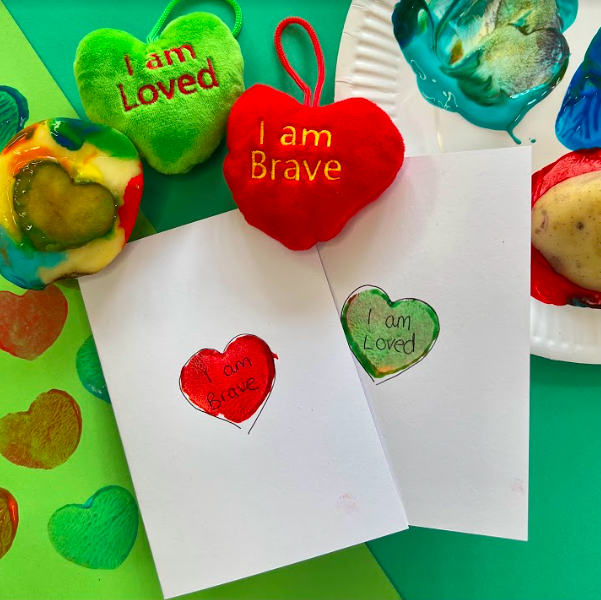The first Hug-a-Bug World book, I am Unique, is based on the affirmation that being different is cool. We all have different appearances, talents and ways in which we live our lives. At Hug-a-Bug World we identify with and accept our unique ways. Our uniqueness is to be celebrated!
Empathy flows through Hug-a-Bug World to promote understanding and acceptance of our unique differences. Our aim with Hug-a-Bug World is to help build empathy and resilience in children to guide them towards understanding others better. This helps them to form emotionally mature relationships.
Having empathy is a vital skill that helps us to socialise and connect with others in a meaningful way. Empathy comes under the umbrella of Emotional Intelligence (EI). If someone feels understood, especially at difficult times, they will feel safer, more secure, and connected. Likewise, if they also take time to appreciate and understand others, their bonds will grow stronger.
How do we nurture empathy in children?
We can role model empathy through the way we parent and the way we accept others in our everyday life. When it becomes a part of the belief and value system within the home, it soon becomes natural for a child to embrace difference in their lives.
It is important to understand the feelings and emotions of others. Having empathy can help your child to build relationships and have a low tolerance for negative behaviours. By supporting others, they are also more likely to receive support back from their peers if they need it.
Real world example:
Your child is settled at school, and another child starts their first day. The new child is sobbing as their mother leaves them. Your child is showing signs in his facial expression and body language that the situation is affecting him. You give reassurance to your child by telling him that everything is okay and you comfort them.
What else can you do? Some children will connect with others naturally and offer comfort. If your child doesn’t, suggest how they can offer their kindness to a struggling child by greeting them, showing them where things are and offering to sit with them or play.
All children need guidance as they develop. Parents can teach, coach, support, and reassure, whilst encouraging independence. As much as we do not want our children to suffer emotionally, they need experiences to build coping skills and manage their emotions. Life will bring them challenges when you are not around. Talk to them when things come up and guide them towards solutions.
Real World Scenario:
Think of a time when someone sat with you when you were upset. What helped you? What do you feel when someone is upset around you? Being supported and accepted while going through an emotional process is crucial. What did you learn that you can do for your child when they’re upset? What can you pass onto them so they can give to others when they are upset?
Simple steps to connect with children when they need emotional support:
- Comfort: when your child is upset, give them your full attention and comfort them
- Listen: pay attention to their story to understand their perspective
- Accept: validate their feelings and help them to label their emotions
- Question: when they settle down, ask them questions to fully understand what is going on for them, and how they feel.
Some children feel overwhelmed when expressing their emotions and may need space and time to breathe. Help their emotional regulation skills by giving them the space they need, encourage them to take some deep breaths and reassure them that you are there for them when they are ready.
These simple steps will help you build an emotionally trusting relationship with your child. By showing empathy, giving your full attention and focusing on your child, they will feel safe and supported.
Once the emotional impact has settled, you can gently move them towards other strategies and problem-solving skills to support their learning.
Stronger steps to connect with children when they need emotional support:
- Share various options for meeting their needs and allow them to choose
- Help your child to cope by sharing ideas for what to do next
- Ask for their ideas on how they can help others
- Share what you see in them at different times: facial expressions and body language
- Share times when you have felt sad and what helped you: time alone to settle, talking to someone about what happened, cuddles, hugs, comfort, favourite toy, etc.
- Teach them that emotions come and go and don’t have to stay stuck
- Share examples of when similar things have happened before
- Manage fears by giving other perspectives
- Explain that they don’t need to take things personally or react on impulse
- Talk to your child about their behaviour, what is acceptable, what is not, and why.
Having sensitive and positive responses helps children feel secure and shows them that you are there for them. Use these delicate times as an opportunity for them to learn.
Being empathic does not mean absorbing bad behaviour from anyone. Children also need to be assertive and able to set boundaries. With these skills, they are less likely to take physical action toward someone else when they are upset.
3 Take aways:
The first Hug-A-Bug World book, I am Unique, is based on the affirmation that being different is cool.
Empathy flows through Hug-a-Bug World to promote understanding and acceptance of our unique differences.
Having empathy is a vital skill that helps us to socialise and connect with others in a meaningful way.
Reflection:
What do you do to help support your child emotionally?
If you liked this, you may also like to read Building Social Skills with your Child
Support us by liking our FACEBOOK PAGE and following us on INSTAGRAM




